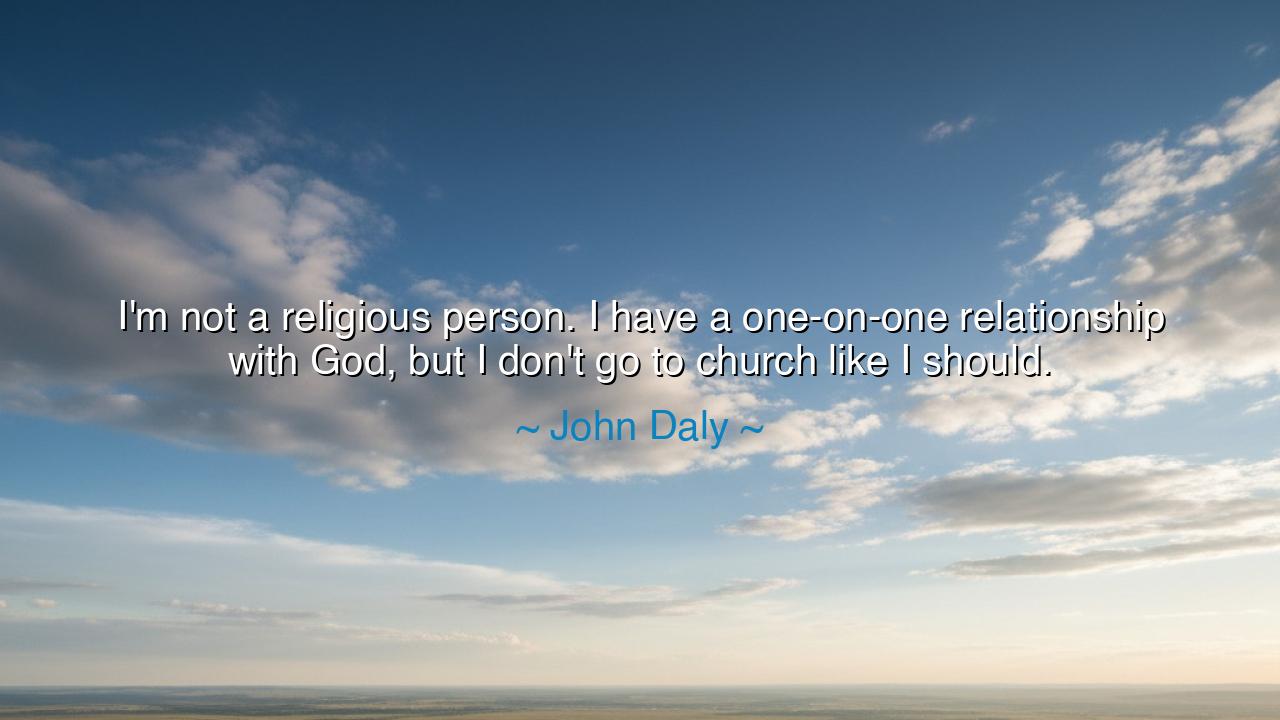
I'm not a religious person. I have a one-on-one relationship
I'm not a religious person. I have a one-on-one relationship with God, but I don't go to church like I should.






Hear the words of John Daly, who confessed with honesty of spirit: “I’m not a religious person. I have a one-on-one relationship with God, but I don’t go to church like I should.” In this statement breathes the eternal struggle between the outer form of faith and the inner flame of devotion. He draws a line between religion, which is the gathering of many under rites and laws, and the relationship with God, which is the secret communion of the heart.
To say, “I am not a religious person,” is to reject the trappings of ritual without rejecting the divine itself. It is the cry of one who seeks truth not in the crowd but in the solitude of his own soul. For the temples of stone may crumble, and the chants of men may fade, but the whisper between a mortal and his Maker endures beyond all measure.
Yet Daly confesses also a sense of duty unmet: “I don’t go to church like I should.” Here the tension is revealed, for the ancient call to assemble has long been seen as a pillar of faith. The gathering of believers is a fire where sparks are shared and faith is sustained. To neglect it is to feel the weight of guilt, even while clinging to the direct bond with the Eternal. Thus the heart is torn between freedom and tradition, between the solitary path and the well-trodden road.
This saying springs from the deep well of human longing, where men yearn for both independence of spirit and the comfort of community. It recalls the prophets who walked alone in the wilderness, speaking with God without altar or priest. Yet it also echoes the wisdom of the elders, who built sanctuaries so the faithful might be strengthened together. Both paths bear truth, yet neither without struggle.
Let future generations remember: the relationship with God is not bound by walls nor silenced by absence. Whether in temple or in solitude, it is the sincerity of the heart that sanctifies the soul. But let not pride scorn the fellowship of others, for both solitude and community are gifts when held in balance. Thus speaks the wisdom hidden in Daly’s words: find your path to the Divine, but walk it with humility, and honor both the secret and the shared.






VTNguyen Van Tan
This quote seems to capture the essence of a lot of people's spiritual experiences today—faith without the structure of formal religion. But I wonder: if someone avoids church, does that mean they’re less connected to their faith, or is their personal relationship enough? Can we really nurture spiritual growth outside of community rituals, or is that connection weaker without the church environment?
MHman hoang
I appreciate this quote because it’s honest and shows that spirituality doesn't always align with traditional practices. However, it raises an interesting question: if one doesn’t participate in religious activities like church, how do they nurture their faith? Can a relationship with God truly be separate from communal worship, or does that community experience provide something necessary for growth?
DBDuyen Bich
John Daly’s words reflect a common sentiment. Many people claim to have a personal relationship with God without feeling the need for organized religion. But then, why is there such pressure to attend church if faith is personal? Does going to church make someone a better person, or is it the individual connection with God that truly matters? What’s your take on this?
NTVan Dung Nguyen Thi
This quote really makes me think about the distinction between personal faith and religious practices. Is it enough to have a one-on-one relationship with God, or is there value in participating in organized religion and attending church? I guess it depends on what you believe religion provides. Does the community aspect of church offer something that a personal connection with God can't?